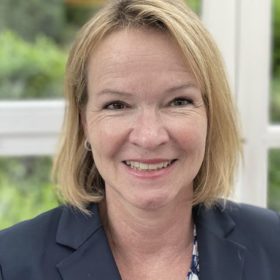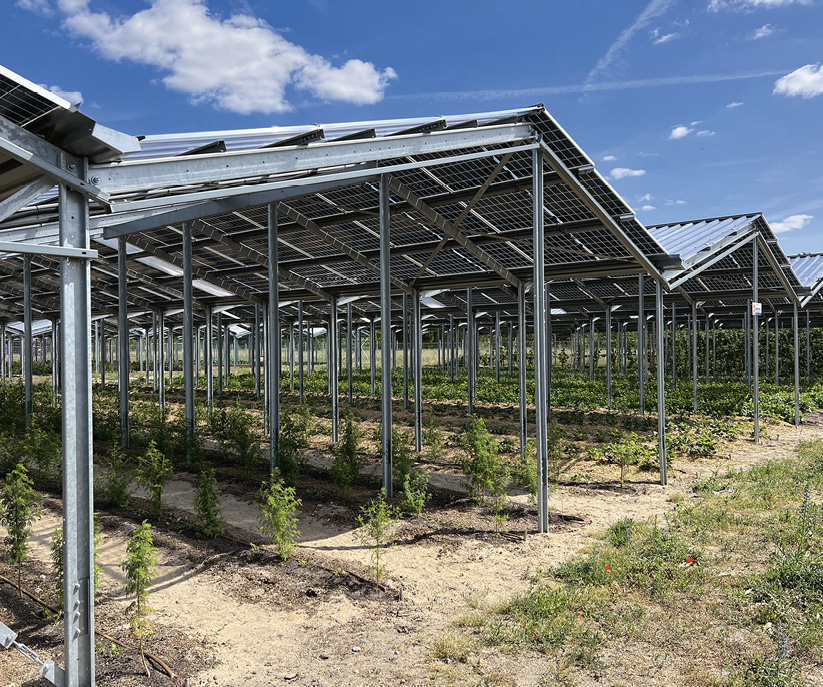From pv magazine 07/2022

This food and energy (F&E) concept has been on show at South Africa’s North-West University since 2014. Can you tell us about the project?
We’re working to combine our innovative technological experience in renewables with sustainable local food production, crop protection, water management, education, and job creation. Since 2014 we’ve been operating a “SUNfarming Food and Energy (F&E) Plant” at the Northwest University (NWU) Potchefstroom campus in South Africa. The plant is used to do joint scientific research on food plants and herbs underneath the solar modules. After the F&E plant was expanded into the F&E training center in 2016, the facilities were also used to develop joint certified training programs for students, local people and to produce healthy food (vegetables, fruit, medicinal herbs) for low-income communities in the area while generating carbon-neutral solar energy for the university at the same time.
In 2019 we started a food relief program, producing 10 tons (200,000 meals) of pre-cooked maize porridge blended with medicinal herbs grown in our F&E plant. Within a week we, together with our partners, shipped the “vitality porridge” to Mozambique after cyclone Idai left a major humanitarian crisis in its wake. We also founded a daughter company, SUNCybernetics, offering the South African Photovoltaic Industry Association (SAPVIA) endorsed PV GreenCard training for those keen to own, install, or maintain PV systems in a safe, compliant, and functioning fashion.
That same year we transferred and implemented the F&E concept on a megawatt scale to a refugee camp in Osmanyie, Turkey. Thereby supplying refugees with secure vegetables, fruit, medicinal herbs and chickens bred under PV modules. More F&E plants are planned at other locations in South Africa, Madagascar, Sri Lanka and in Latin America.
Independent consulting agency Steward Requeen assessed the macroeconomic effects of the Sunfarming projects on local communities as excellent. Each year up to 50 people can be trained and up to 24 new jobs could potentially be created.
These “Healthy School Meals” are great proof of the value of this system. The program received renewed funding in 2021 – where is it headed?
The core element of our programs is our locally produced vitality porridge, made with maize and blended with ginger, turmeric, and African wormwood grown by former trainees of our F&E plant. Rich in vitamins, minerals and proteins, the vitality porridge also boosts the immune system and supports children’s healthy development. The meals are distributed to schools in rural areas, areas of high unemployment, and low-socioeconomic status. Over 52,000 people benefited from the project, including 360 local people who were trained in sustainable vegetable gardening and were supplied with vegetable garden starter kits for their home gardens. Another 72 people received entrepreneurship training to start their own small agricultural businesses. In another joint project, which started in June 2021, Sunfarming is distributing 28.5 million portions of vitality porridge to 40 schools with around 12,000 children and their 60,000 family members until 2023. All schools will also have a garden to produce food sustainably for their kitchens. 507 million portions of vitality porridge were distributed in 2021 alone.
Can you speak to the variety of agricultural produce? What grows best with PV?
Our agriPV concepts vary in height depending on the goals one wants to achieve – increased biodiversity, food production, as well as animal breeding. The environmental conditions and local market play an important role in what will be produced.
The eco-PV-systems are one meter at the lowest point and 2.4 meters at the highest, and equipped with drip irrigation systems. Bifacial glass-glass modules let light through while the width between rows is around three meters. Depending on the region, the rows can be netted from predators or extreme weather. Underneath, insects, smaller animals, birds, sheep, and poultry can live in a protected area and flowering meadows can grow. The agriPV systems may vary from 1.5 meters to 2.1 meters at the lowest point to 2.9 meters up to 3.6 meters at the highest. They’ve been developed for agricultural and horticultural production even with small tractors. The systems are ideal for vegetables like tomato, cucumber, peppers, cabbage, salad, spinach, etc, and berries such as raspberries, strawberries, and even wine grapes, as well as herbs.
The program also trains women in sustainable agriculture, PV and entrepreneurship. How are local women utilizing agriPV?
Once we’ve installed the plant, local people are trained in agricultural and horticultural production underneath the PV panels and make use of the produce. In the planned large scale F&E plants to be installed in various parts of South Africa, certified trainings will be available to those motivated to start their own business as subcontractors or franchise entrepreneurs while making use of and benefiting from the infrastructure.
Wherever women are empowered we find the alleviation of poverty. Can education and training lead to sustainable economic opportunities for local communities, and particularly opportunities for women?
Absolutely! Women are very motivated to contribute to the family income and food with their own work and to become self- sufficient. Therefore, we see that women work hard in the trainings and more than 90% start to grow their own home gardens. So far, about 20% of all participants are successful in either finding a job in farming afterwards or in starting their own small business in agriculture or horticulture. However, long-term personal support is mostly needed in order to help the trainees solve their day-to-day problems in their activities as well as to guide them with how products can be sold in the local market or how they could develop their business further.
South Africa’s energy landscape is at a pivotal transition point, with renewable energy expansion plans proposed to meet climate goals. Are you optimistic about the South African market and what role can large-scale agriPV play?
South Africa has excellent conditions for the transition to renewable energies since there are vast areas of arable land, as well as areas which were used for mining or other industrial purposes that can utilize agriPV solutions. Foreign investors like Sunfarming however, require calculable conditions as far as access to the grid and wheeling tariffs. Time frames in licensing or registration processes are a concern. We hope that the processes will become more transparent and standardized and bureaucracy is minimized so that investments and project realizations can be accelerated.
We are cautiously optimistic about the market as Sunfarming needs to compete tariff wise with solar-only projects which is not sensible. In the context of a just energy transition, policy makers should give preference and support to agriPV solutions which can address multiple socio-economic challenges whilst decreasing the carbon energy dependence of the country. Large-scale agriPV could help to protect existing farmland from climate change conditions and even save farm businesses, while at the same time contributing to an increase in food production due to higher yields and the prevention of climate change-related damages. With the opening of the South African energy market to private energy suppliers, Sunfarming is already developing more F&E plants now in Eastern and Western Cape, selling the energy to private offtakers while FEED may use part of the infrastructure as training centers.
This content is protected by copyright and may not be reused. If you want to cooperate with us and would like to reuse some of our content, please contact: editors@pv-magazine.com.









2 comments
By submitting this form you agree to pv magazine using your data for the purposes of publishing your comment.
Your personal data will only be disclosed or otherwise transmitted to third parties for the purposes of spam filtering or if this is necessary for technical maintenance of the website. Any other transfer to third parties will not take place unless this is justified on the basis of applicable data protection regulations or if pv magazine is legally obliged to do so.
You may revoke this consent at any time with effect for the future, in which case your personal data will be deleted immediately. Otherwise, your data will be deleted if pv magazine has processed your request or the purpose of data storage is fulfilled.
Further information on data privacy can be found in our Data Protection Policy.